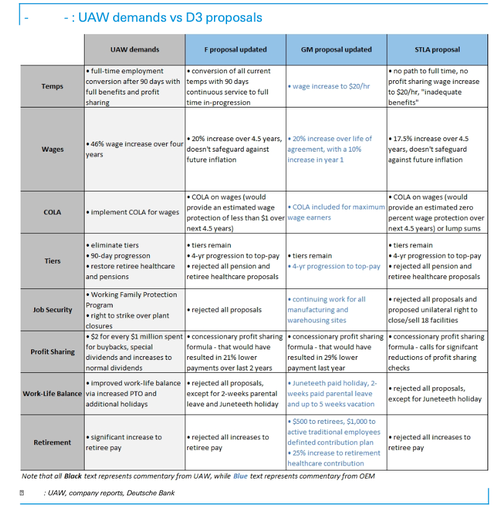
United Auto Workers President Shawn Fain plans to announce expanded strikes Friday morning if talks with Detroit's legacy automakers do not make significant progress on a new four-year labor deal, reported Reuters, citing a person familiar with the matter.
The new UAW-imposed deadline follows a week after the union declared its intention to broaden its initial strikes on Sept. 15 at the assembly facilities of General Motors Co., Stellantis NV, and Ford Motor Co. to include 38 more parts and distribution centers for GM and Stellantis. However, UAW has decided not to expand strikes at Ford over positive talks.
On Wednesday, UAW's Facebook page posted a Facebook Live event slated for Friday at 1000 ET. The union calls it a "stand-up announcement.'"
"If Fain triggers walkouts at more plants starting at noon (1600 GMT) on Friday, the UAW is expected to continue work stoppages currently underway until a new contract is ratified," the source said.
In a separate report, a source told Bloomberg that union representatives met with GM negotiators on Wednesday evening, though no immediate meetings with Ford or Stellantis were planned.
"The union's strike strategy is to remain flexible and respond to what is happening at the bargaining table," the person said. When asked whether Ford would be included in the next round of strikes, the person said: 'Everything is on the table.'
As of Wednesday, the strike involves 18,300 workers or about 12% of UAW's 146,000 members whose labor contracts expired two weeks ago (Sept. 14).
UAW boss Fain has yet to budge from 40% pay hike demand over a new four-year contract, while automakers are around 20%. A Deutsche Bank note breaks down just how far apart the union and automakers are from striking an imminent deal.
On Tuesday, President Biden joined Fain on the picket lines in Michigan. When a reporter asked the president: "Mr. President, should the UAW get a 40% [pay] increase?" He responded: "Yes."
"Mr. President, should the UAW get a 40% [pay] increase?"
— RNC Research (@RNCResearch) September 26, 2023
BIDEN: *confused* pic.twitter.com/Ya8LbCOimv
It's unprecedented for the president to walk the picket line. Presidents historically avoid strikes and usually act as mediators.
On Wednesday night, former President Trump was in Michigan, pitching to autoworkers he would terminate Biden's EV mandate.
TRUMP: On day one I will terminate Biden’s EV mandate pic.twitter.com/WaKsqkJMnF
— Jack Poso 🇺🇸 (@JackPosobiec) September 28, 2023
... and why would Trump do that? Well, as explained in a Detroit Free Press opinion piece by Mike Rogers, a Republican candidate for Michigan's open US Senate seat, Biden's EV push "will kill Michigan jobs":
With the UAW strike expanding against the Big 3 automakers, it's clear we are at a critical point that will determine the future path of our state's most important economic sector. Not only are the futures of General Motors, Ford and Stellantis at risk, along with countless Michigan-based suppliers that help uphold the industry, our national security is put into question as well.
There is a lot on the line as Biden Administration red tape forces auto companies to transition to electric vehicles. What does this mean for workers? Estimates show that over 175,000 people in Michigan are employed directly for auto companies or parts suppliers, and since building electric vehicles requires at least 30% less labor, that could mean tens of thousands of good paying manufacturing jobs here in Michigan could be eliminated.
The stated goal of the Biden administration is reducing greenhouse gas emissions to fight climate change. The problem is their solution to accomplish this goal is misguided, will eliminate jobs that drive our economy, and the biggest beneficiary won't be the climate, it will be China.
The next round of strikes could affect the production of large trucks and SUVs. One estimate by Morgan Stanley's auto strategist, Adam Jonas, shows automakers stand to lose around $250 million in profits per day.
United Auto Workers President Shawn Fain plans to announce expanded strikes Friday morning if talks with Detroit’s legacy automakers do not make significant progress on a new four-year labor deal, reported Reuters, citing a person familiar with the matter.
The new UAW-imposed deadline follows a week after the union declared its intention to broaden its initial strikes on Sept. 15 at the assembly facilities of General Motors Co., Stellantis NV, and Ford Motor Co. to include 38 more parts and distribution centers for GM and Stellantis. However, UAW has decided not to expand strikes at Ford over positive talks.
On Wednesday, UAW’s Facebook page posted a Facebook Live event slated for Friday at 1000 ET. The union calls it a “stand-up announcement.'”
“If Fain triggers walkouts at more plants starting at noon (1600 GMT) on Friday, the UAW is expected to continue work stoppages currently underway until a new contract is ratified,” the source said.
In a separate report, a source told Bloomberg that union representatives met with GM negotiators on Wednesday evening, though no immediate meetings with Ford or Stellantis were planned.
“The union’s strike strategy is to remain flexible and respond to what is happening at the bargaining table,” the person said. When asked whether Ford would be included in the next round of strikes, the person said: ‘Everything is on the table.’
As of Wednesday, the strike involves 18,300 workers or about 12% of UAW’s 146,000 members whose labor contracts expired two weeks ago (Sept. 14).
UAW boss Fain has yet to budge from 40% pay hike demand over a new four-year contract, while automakers are around 20%. A Deutsche Bank note breaks down just how far apart the union and automakers are from striking an imminent deal.
On Tuesday, President Biden joined Fain on the picket lines in Michigan. When a reporter asked the president: “Mr. President, should the UAW get a 40% [pay] increase?” He responded: “Yes.”
“Mr. President, should the UAW get a 40% [pay] increase?”
BIDEN: *confused* pic.twitter.com/Ya8LbCOimv
— RNC Research (@RNCResearch) September 26, 2023
It’s unprecedented for the president to walk the picket line. Presidents historically avoid strikes and usually act as mediators.
On Wednesday night, former President Trump was in Michigan, pitching to autoworkers he would terminate Biden’s EV mandate.
TRUMP: On day one I will terminate Biden’s EV mandate pic.twitter.com/WaKsqkJMnF
— Jack Poso 🇺🇸 (@JackPosobiec) September 28, 2023
… and why would Trump do that? Well, as explained in a Detroit Free Press opinion piece by Mike Rogers, a Republican candidate for Michigan’s open US Senate seat, Biden’s EV push “will kill Michigan jobs”:
With the UAW strike expanding against the Big 3 automakers, it’s clear we are at a critical point that will determine the future path of our state’s most important economic sector. Not only are the futures of General Motors, Ford and Stellantis at risk, along with countless Michigan-based suppliers that help uphold the industry, our national security is put into question as well.
There is a lot on the line as Biden Administration red tape forces auto companies to transition to electric vehicles. What does this mean for workers? Estimates show that over 175,000 people in Michigan are employed directly for auto companies or parts suppliers, and since building electric vehicles requires at least 30% less labor, that could mean tens of thousands of good paying manufacturing jobs here in Michigan could be eliminated.
The stated goal of the Biden administration is reducing greenhouse gas emissions to fight climate change. The problem is their solution to accomplish this goal is misguided, will eliminate jobs that drive our economy, and the biggest beneficiary won’t be the climate, it will be China.
The next round of strikes could affect the production of large trucks and SUVs. One estimate by Morgan Stanley’s auto strategist, Adam Jonas, shows automakers stand to lose around $250 million in profits per day.
Loading…





